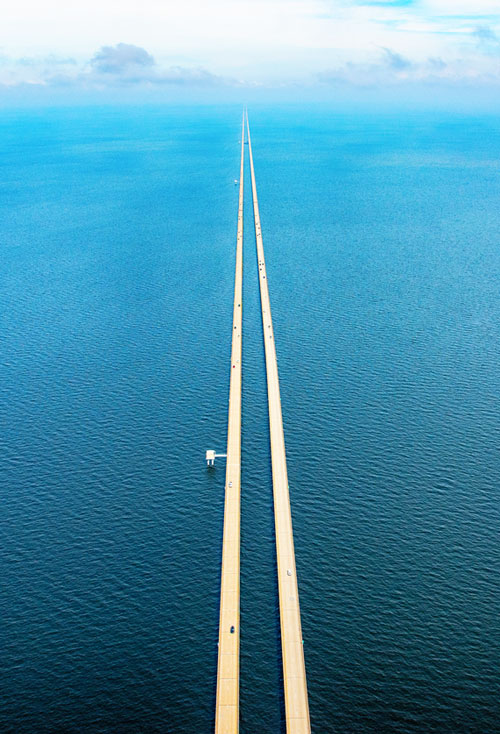Humankind has employed bridges of one kind or another since the Stone Age 2,000-plus years ago, when Neolithic peoples used fallen trees, stepping stones, and crude boardwalks to traverse between two points over an obstacle, such as a body of water. Bridges have come a long way since then in terms of aesthetics, architecture, and, especially, size and the distances they span. Tourist attractions in their own right, some bridges cross entire lakes and river deltas or provide commuter routes between cities hundreds of miles apart. Ahead, here are nine of the longest bridges in the world.
9. Donghai Bridge – China (20.2 miles)
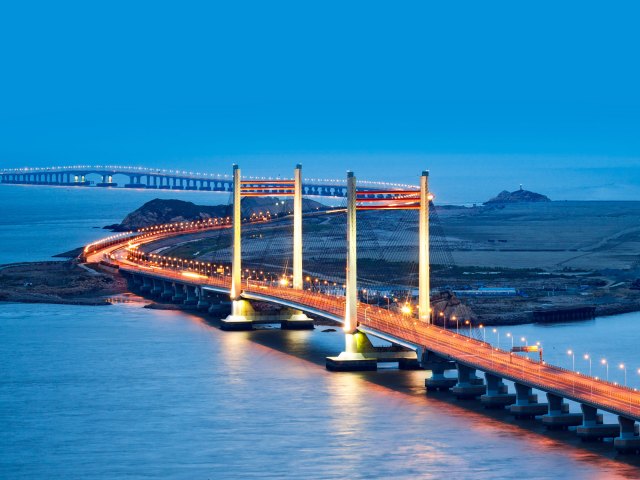
Donghai Bridge seems to snake endlessly across Hangzhou Bay — an inlet of the East China Sea — from Shanghai’s Pudong area. When it opened to vehicular traffic in 2005, it became China’s first cross-sea bridge and remains one of the longest in the world. The 20.2-mile-long bridge provides passage from mainland Shanghai to Yangshan Port, a deepwater port for container ships. The six-lane, low-level viaduct is built in an S-shape, which helps it withstand typhoons and large waves. The bridge also features cable-stayed sections designed to allow large ships to navigate around the bay.
8. Hangzhou Bay Bridge – China (22.2 miles)
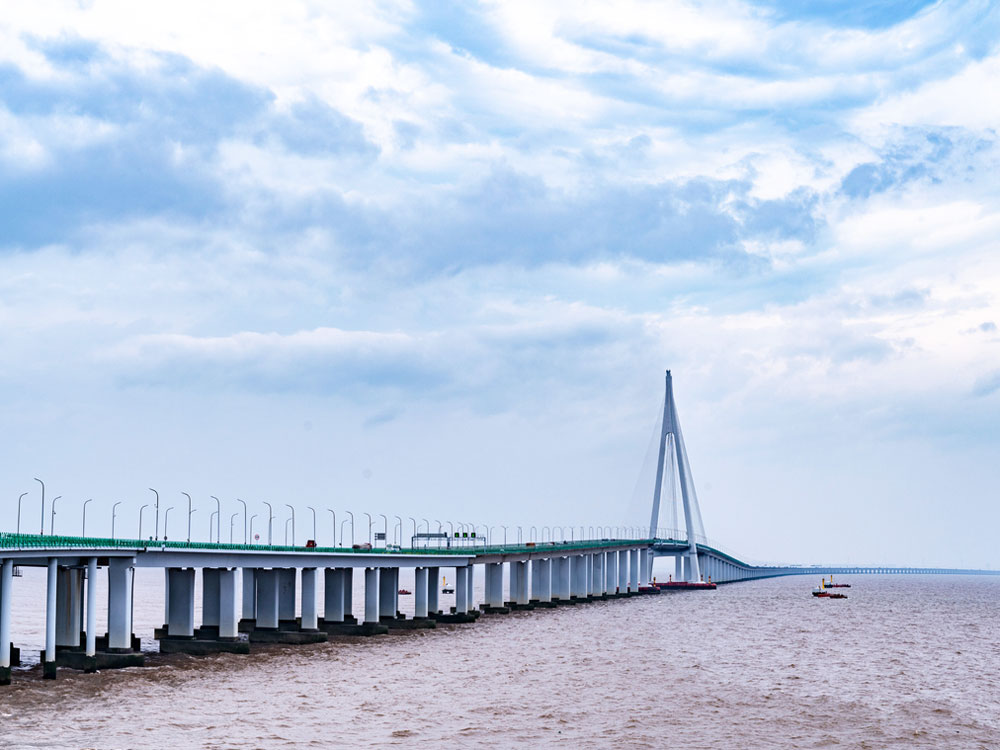
Opened in 2008 and crossing the same bay, the Hangzhou Bay Bridge is a 22.2-mile-long structure that connects the cities of Jiaxing and Ningbo and is among the world’s longest sea-crossing bridges. At nighttime, the S-shaped structure resembles a rainbow in the sea thanks to the rainbow color scheme of the guardrails — each color covers around three miles of rails. A unique feature for tourists is a service center located at the midway point of the bridge named Land Between the Sea and the Sky. It’s home to a luxury hotel, restaurants, shops, and a 478-foot-high viewing platform.
7. Lake Pontchartrain Causeway – Louisiana (23.8 miles)
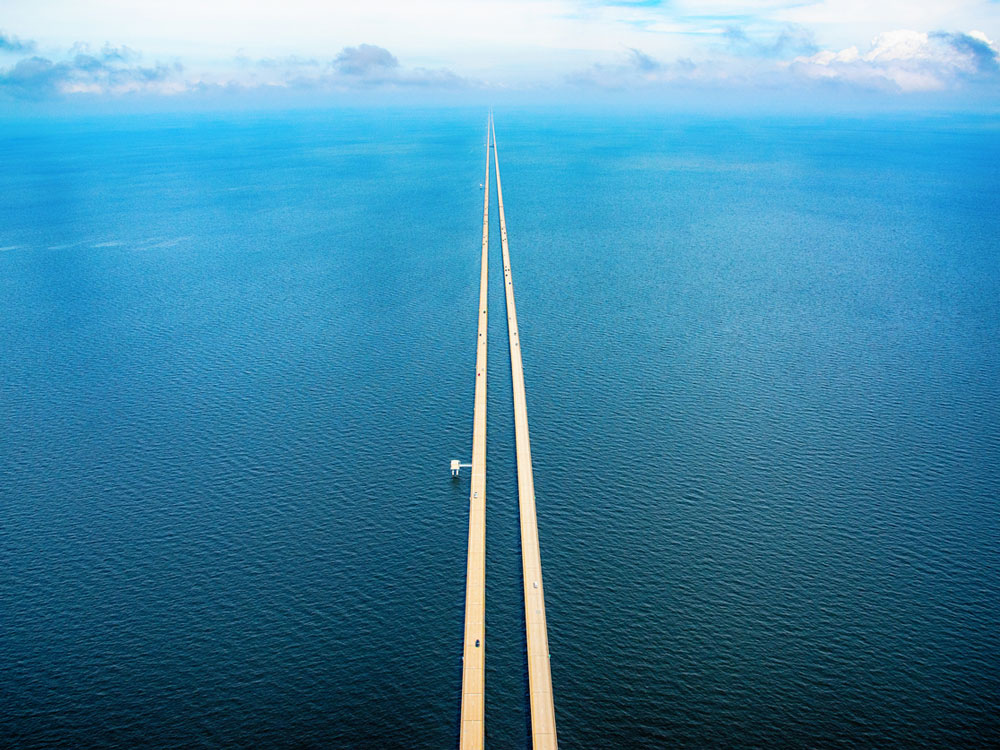
The idea for a bridge across Louisiana’s Lake Pontchartrain was first proposed in the early 1900s. New Orleans was growing in population, and commuters faced a long, roundabout journey around the lake when traveling in and out of the city. The opening of the Lake Pontchartrain Causeway in 1956 dramatically reduced travel times and fueled the development of communities on the north shore of the lake. Originally a single two-lane bridge, a second parallel span was built in 1969 to accommodate booming traffic. The latter stretches for around 23.8 miles, making it the world’s longest continuous bridge over water and the longest bridge in the United States.
6. Jiaozhou Bay Bridge – China (25.8 miles)
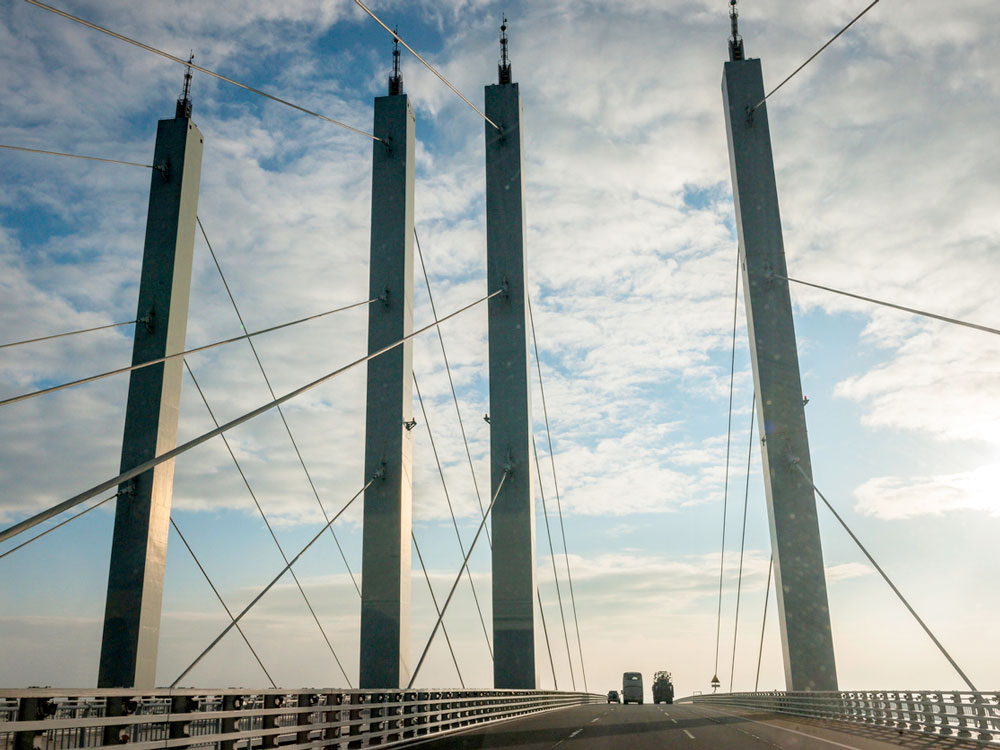
The 25.8-mile-long Jiaozhou Bay Bridge opened in 2011 after four years of construction, linking China’s eastern port city of Qingdao with the Huangdao district. The bridge features six lanes, 5,000 pillars, and some 450,000 tons of steel. When it opened, the bridge earned the Guinness World Record for longest overwater bridge. However, this was later disputed, as the measurement included aggregate structures including land bridges on either end. To settle the matter, Lake Pontchartrain Causeway retained the Guinness title of “longest bridge over water (continuous),” while Jiaozhou took the record for “longest bridge over water (aggregate length).” However, the Jiaozhou Bay Bridge lost that record just seven years later to another bridge on this list.
5. Bang Na Expressway – Thailand (33.5 miles)
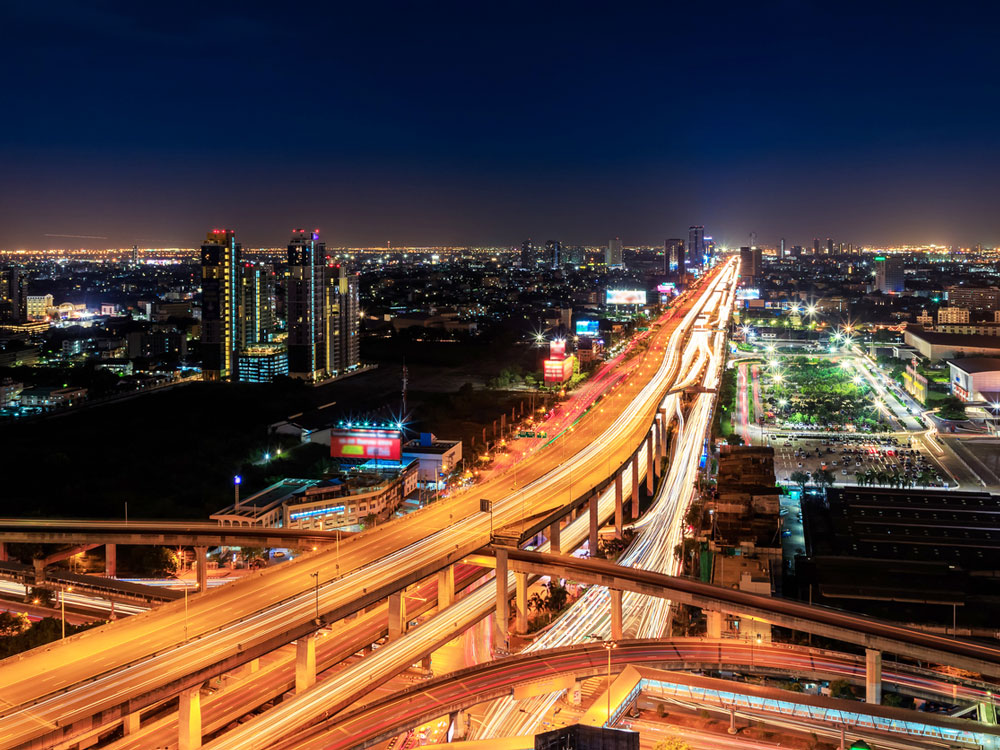
The Bang Na Expressway was built to ease traffic congestion along a major highway between Bangkok and Chon Buri, Thailand. This impressive structure is the world’s longest road bridge — a 33.5-mile-long toll road designed in the form of a viaduct that travels directly above another highway. In addition to being an important road link, the expressway affords excellent views of Bangkok’s skyline.
4. Hong Kong-Zhuhai-Macao Bridge – China (34 miles)
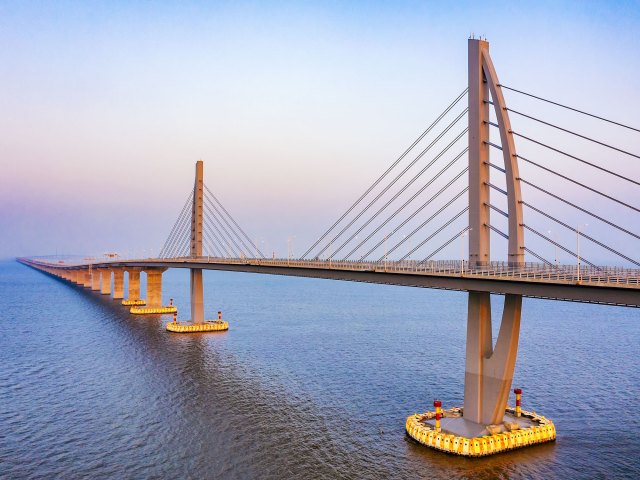
In 2018, the Hong Kong-Zhuhai-Macao Bridge took over the title of world’s longest bridge over water (aggregate length) from the Jiaozhou Bay Bridge. The 34-mile-long feat of engineering consists of three cable-stayed bridge sections, an underwater tunnel, and four artificial islands. It crosses the Pearl River Delta and connects Hong Kong, Macao, and Zhuhai. After opening, the travel time between Zhuhai and Hong Kong International Airport was reduced from four hours to 45 minutes. There are immigration and customs checkpoints at both ends of the bridge, requiring a valid passport to travel from end to end.
3. Tianjin Grand Bridge – China (70.7 miles)
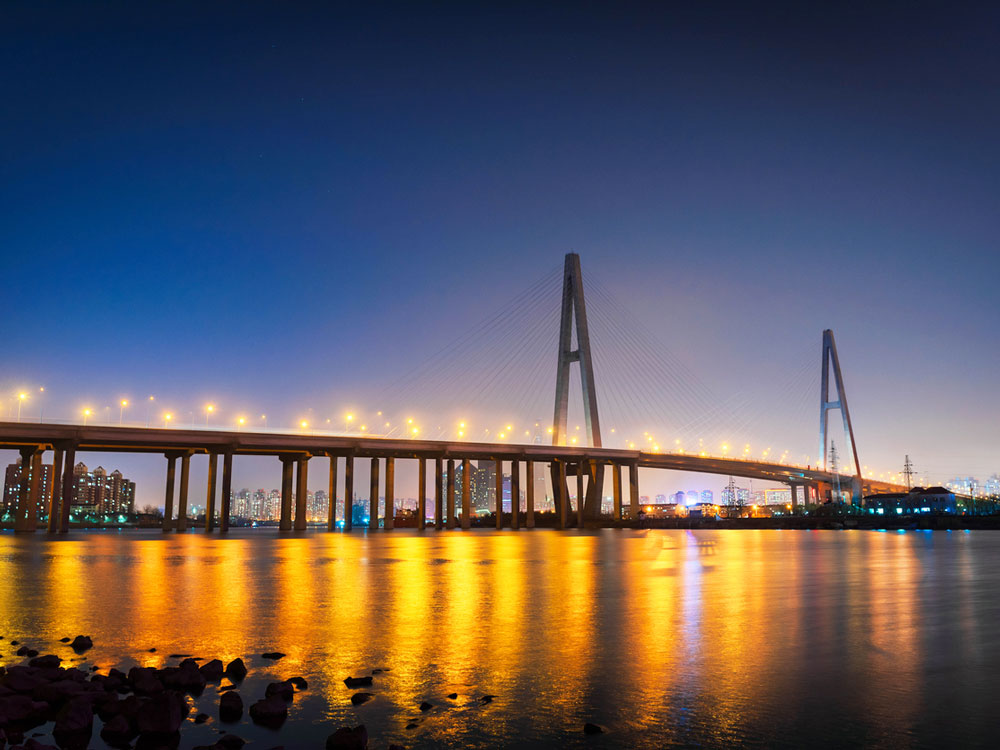
Tianjin Grand Bridge is a railroad viaduct that stretches for an incredible 70.65 miles. The bridge travels through a mix of urban and natural landscapes between the cities of Langfang, about 30 miles southeast of Beijing, and Qingxian. Opened in 2010, it is one of several bridges and viaducts on the 819-mile-long Beijing-Shanghai High Speed Railway. The idea for an elevated viaduct meant that both the original train route could be maintained and environmental damage would be kept to a minimum. Tianjin Grand Bridge features 32 individual girder sections that weigh an impressive 860 tons each.
2. Changhua-Kaohsiung Viaduct – Taiwan (97.8 miles)
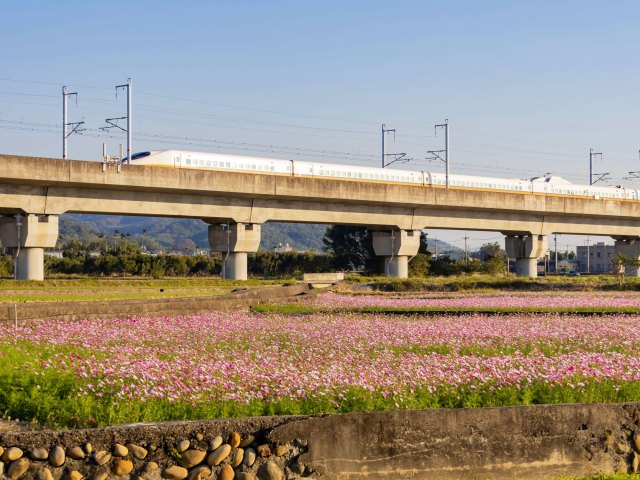
The Taiwan High Speed Rail network travels for around 215 miles from Taipei to Kaohsiung, Taiwan’s third-largest city. Notably, almost half of the entire journey is along the 97.75-mile-long Changhua-Kaohsiung Viaduct. Because the railway crosses several fault lines, the viaduct had to be designed to withstand earthquakes. Trains can stop in the event of seismic activity, and the design allows for quick repairs in the aftermath of an earthquake. Over 60 million passengers travel over the bridge via the rail network each year.
1. Danyang-Kunshan Grand Bridge – China (102.5 miles)
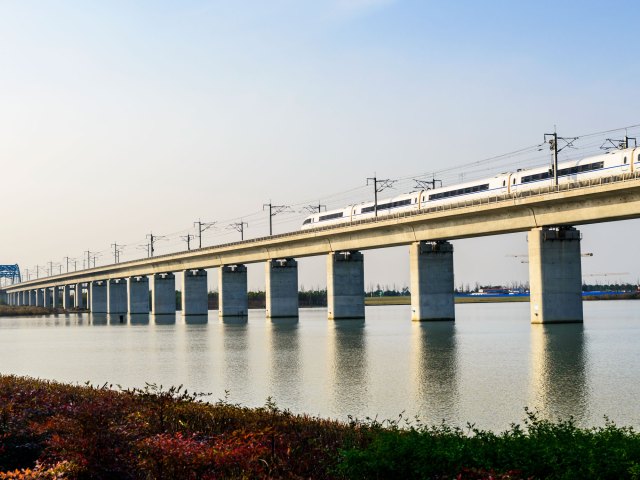
Built over a period of four years and at an expense of $8.5 billion, the Danyang-Kunshan Grand Bridge is the world’s longest bridge. It extends for a mammoth 102.5 miles between Shanghai and Nanjing, the capital of China’s eastern Jiangsu province. The bridge makes up a large part of the southern leg of the Beijing-Shanghai High Speed Railway. A 10,000-strong workforce helped erect the bridge, which can withstand a hit from a 300,000-ton naval ship. An architectural and engineering masterpiece, the bridge has also become a popular tourist attraction. Visitors can take a train ride across the bridge with views of the surrounding natural landscape of canals, lakes, rivers, and rice paddies.
Featured image credit: Art Wager/ iStock
More from our network
Daily Passport is part of Optimism, which publishes content that uplifts, informs, and inspires.






